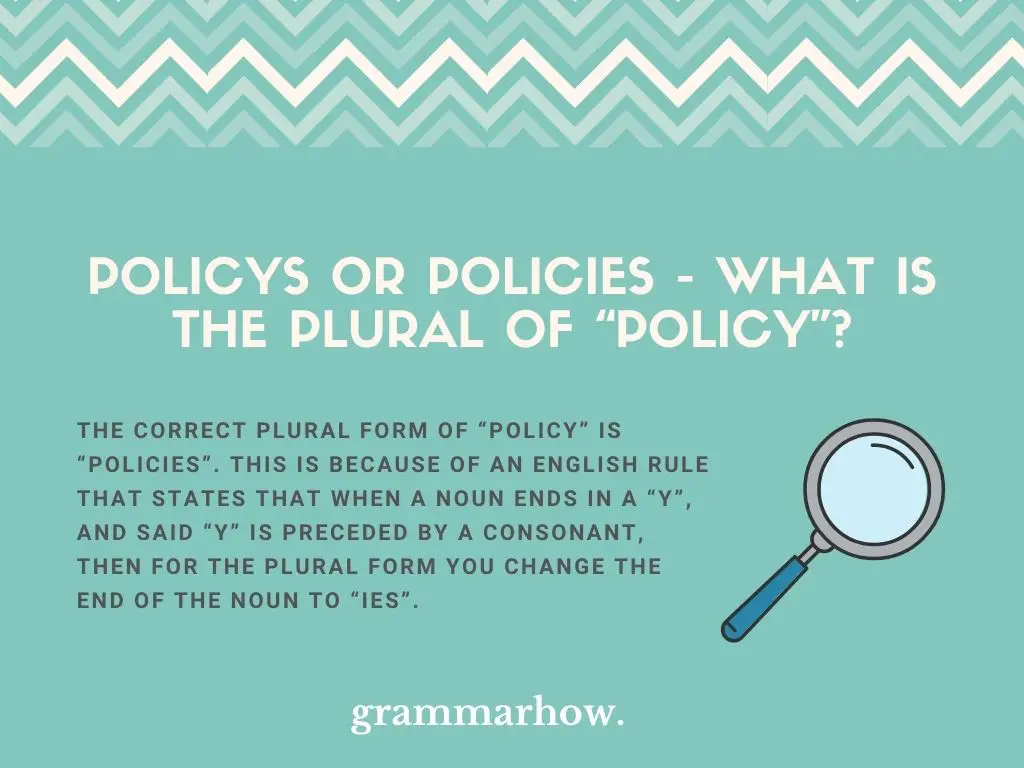With some nouns in English, pluralizing is as easy as adding an “s” at the end of it. However this isn’t the case with a lot of nouns. For example, if you were to pluralize “Policy”, would you use “Policys” or “Policies”? This article will answer that question and more.
Policys or Policies – What Is The Plural Of “Policy”?
The correct plural form of “Policy” is “Policies”. This is because of an English rule that states that when a noun ends in a “y”, and said “y” is preceded by a consonant, then for the plural form you change the end of the noun to “ies”.

This is one of those English rules that many people don’t know, but if you learn it then that will allow you to intuitively pluralize many nouns that end in “y”.
Therefore, “Policys” is always wrong and should be avoided because it makes no grammatical sense.
Is It Correct To Use “Policy’s” As The Plural Of “Policy?
It’s incorrect to use “Policy’s”, with an apostrophe, as the plural of “Policy”. In the English language, the apostrophe “‘“ is normally used for contractions and possessives.
There are a small number of cases where an apostrophe is used to denote a plural form, but this is in very specific cases, and they all refer to incredibly short words: A’s, B’s, No’s, etc.
Examples Of How To Use The Plural Of “Policy” In A Sentence
Here are a few example sentences that will properly show you the way to pluralize “Policy”:
- Correct: I’ve been looking into all of their insurance policies and there are a lot of them.
- Incorrect: I think before you enroll you would have to check their enrollment policys.
- Correct: What are this institution’s policies to be applied in the case of plagiarism?
- Incorrect: I spent all weekend drafting up an updated version of all our general policys.
- Correct: You have to properly look at all of their policies before you agree to sign the document.
- Incorrect: I think that their policys will be very helpful to fostering your development as a student.
- Correct: The mayor’s office has a lot of policies regarding the disclosing of information.
- Incorrect: The Academy’s policys sadly forbid this kind of violent behavior.
- Correct: My policies don’t generally allow me to take on these cases, but I’ll make an exception.
- Incorrect: She has many policys that can help people in your situation.
Is It “Policy(s)” Or “Policy(ies) For A Parenthetical Plural Suffix?
The correct way to create a parenthetical plural suffix, in the case of “Policy”, is “Policy(ies)”. You can’t type “Policy(s)” because the plural of “Policy” is “Policies”, so “Policy(s)” would make the reader think that the plural of “Policy” is done by adding an “s” at the end.
By typing “Policy(ies)” you’re invoking the rule of transforming the “y” into “ies” in the reader’s heads, so subconsciously you’ll be helping them realize the correct pluralization.
Here are a few example sentences that will show you the correct parenthetical plural suffix for “Policy”:
- Whatever the policy(ies), you will have to defend against it/them no matter what.
- It’s important that you fully design the policy(ies) before your deadline is up.
- You should probably check out their policy(ies) on that specific subject.
- It’s interesting to consider how their policy(ies) might infringe on that topic.
- I quite frankly disagree with whatever policy(ies) they might have regarding that.
- Have you checked out the policy(ies) regarding your specific error/issue yet?
- Before making an account you should read their policy(ies) in detail.
Is It “Insurance Policies” or “Insurance Policys”?
The correct answer is that you should always type “Insurance policies” and never “Insurance policys”. This is because “Policies” is the correct pluralization of “Policy”, and “Policys” is fully grammatically incorrect. Therefore you should always use “Insurance policies” rather than “Insurance policys”.
Here are a couple of examples that will show you the correct and incorrect forms to write them:
- Correct: Have you seen the plethora of insurance policies that we can offer you?
- Incorrect: I was going through the website, reading their insurance policys, when I got a call.
